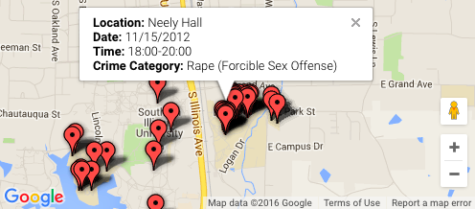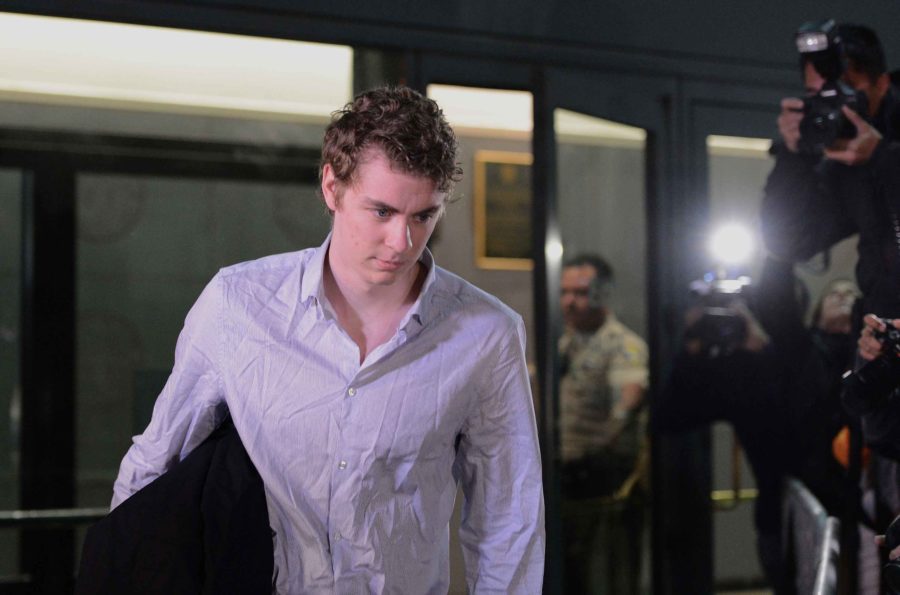To prevent campus rape, colleges change the rulebook from ‘No means no’ to ‘Yes means yes’
Brock Turner leaves the Santa Clara County Main Jail on Friday, Sept. 2, 2016 in San Jose, Calif. Turner was released after serving three months of his six month sentence for the sexual assault of an unconscious woman in January of 2015. The judge in the case, Aaron Persky, has come under fire for a sentence that many consider to be a slap on the wrist. (Dan Honda/Bay Area News Group/TNS)
September 5, 2016
The dorm room door hangers have three simple questions to help students understand consent: “Is the person sober? Is the person awake? Did the person say yes?”
Before 2011, the College of New Jersey didn’t define sexual consent. This year, it reads: “informed, freely and actively given mutually understandable words or actions which indicate a willingness to participate in mutually agreed-upon sexual activity.”
With a new definition and clearer policies, TCNJ has been better able to teach students how to communicate about sexual activity, administrators said.
Advertisement
Colleges and universities across the nation have similarly redefined consent, revised student policies, and tightened regulations in an effort to combat sexual misconduct on campus, including better response when cases are reported.
Many have adopted what is known as “affirmative consent,” turning from the “no means no” message of years past to the new, stronger “yes means yes.”
“The first time you want your students to be educated about effective consent is not after a sexual assault has been reported,” said Angela Lauer Chong, dean of students at TCNJ. “So the real challenge is educating your student community on what effective consent is before.”
MORE: New Illinois rules aimed at helping college campus assault victims
In 2014, California became the first state to make affirmative consent the legal standard on college campuses. New York, Connecticut, and Illinois have since followed suit. The vast majority of four-year colleges and universities in New Jersey have adopted some form of affirmative consent as campus policy.
State Sen. Jim Beach, D-Camden, has proposed legislation that would require the standard at all schools in the state. The standard has also been floated in Philadelphia, in a 2015 hearing called by Councilwoman Blondell Reynolds Brown.
Affirmative consent is increasingly viewed as an emerging gold standard. But critics argue that it is unenforceable, ambiguous, redundant — isn’t all consent affirmative? — or weaker than existing federal protections. Many supporters say the standard alone is not enough.
Advertisement*
“Affirmative consent is a move in the right direction, but I don’t think it’s going to solve all the problems, because in truth we have a broader problem of people not talking openly about what they do and don’t want sexually,” said Zoë D. Peterson, a psychology professor at the University of Missouri-St. Louis who studies sexual consent among college students.
On campuses where an affirmative-consent standard is in place, administrators and students say it has improved the sexual climate.

More: Majority of sexual assaults on campus are in student housing
“We want to make sure that we have something very clear, very public, very obvious to everyone,” said Laura Valente, the dean of students and Title IX coordinator at the New Jersey Institute of Technology, where affirmative consent is the norm starting this fall.
Valente said she hopes teaching the “yes means yes” standard can be a cultural tipping point on campus.
“Eventually, folks who want to initiate sexual contact can understand what their obligations are to obtain consent,” she said, “and folks that are sort of asked for sexual contact know what their rights are, and can be more certain if their rights have been violated.”
Changes to college policies have been driven in part by increased overall awareness of campus sexual assault and by several high-profile cases. The Obama administration began spotlighting the issue in 2011, telling colleges that sexual assault and misconduct are gender-based violence covered under Title IX, the federal law guaranteeing equal treatment. The number of schools being investigated by the Education Department for alleged violations has since ballooned to more than 200.
Four schools in New Jersey and 11 in Pennsylvania are under investigation, with multiple open cases at Princeton University, Temple University, and Allegheny College, among others.
The 2011 Education Department letter, and continuing federal attention to the issue, helped spur Rutgers University to write specific policy on sexual harassment and violence, said Jackie Moran, the Title IX coordinator for the university’s New Brunswick campus.
“Adopting an affirmative-consent standard was not only in line with best practices,” Moran said, “but also gave us a really good tool for educating students what consent is and what consent is not, and how to communicate that with each other.”
More: Key to ending campus sexual assaults is transparency
The University of Pennsylvania has used an affirmative-consent standard since 2012.
At Villanova, where Title IX coordinator Ryan Rost says training and education on issues of sexual climate have been “ahead of the curve for a number of years,” students have been required to complete an online training course since 2008. The university couples that training with an AlcoholEdu online course on liquor consumption, as well as bystander-training intervention.
Orientation at Rowan University, which adopted affirmative consent four years ago, teaches freshmen that the university’s policy goes far beyond “cover your drink, go out with your buddy, the onus again is on the victim,” said Amy Hoch, a Rowan psychologist who sat on a national task force on campus sexual assault prevention.
“With a lot of different information, including the consent policy, students, I think, are definitely talking about this in a different way,” Hoch said.
California schools have seen an increase in reports of sexual misconduct since the state changed its consent standard two years ago — and “that’s what we wanted,” said William Bishop, director of equal opportunity at California State University-Sacramento.
“We wanted an increase, because that means education and outreach efforts were working,” he said.
MORE: SIU under U.S. Department of Education investigation for handling of sexual assault cases
Sexual assault is notoriously underreported, which complicates efforts to evaluate the effectiveness of awareness and prevention programs. And some changes are so new that they have not yet been rigorously studied, said Kristen N. Jozkowski, a public health professor at the University of Arkansas whose research focuses on college students and sexual consent.
Because colleges are also doing so much at once, she said, it’s difficult to identify exactly what’s working.
“Is it the program they’re seeing in freshman orientation, or the signage, or the consent policy that they’re seeing during the semester?” she said. “It’s hard to pinpoint what’s changing.”
Still, Jozkowski and others applauded schools’ moves to adopt affirmative consent and increase awareness efforts, saying it would ultimately lead to safer, healthier campuses.
“It’s not an end-all, be-all, but it could be part of a progression. . . . It’s not going to be any one thing,” she said, “but a combination of several factors or initiatives that have coalesced and pushed, really, a cultural shift forward.”
___
(c) 2016 The Philadelphia Inquirer
Visit The Philadelphia Inquirer at www.philly.com
Distributed by Tribune Content Agency, LLC.
Advertisement









Bobbie • Sep 6, 2016 at 11:51 pm
I don’t see the difference. It’s the same message just different words except “yes means yes” could be interpreted by a man that once the woman says yes there’s no going back. The woman has the right to say “no” even in the moment of penetration. The “yes means yes” movement could be very misleading. “No means no,” is a better wording and more effective way to come across to men and women.